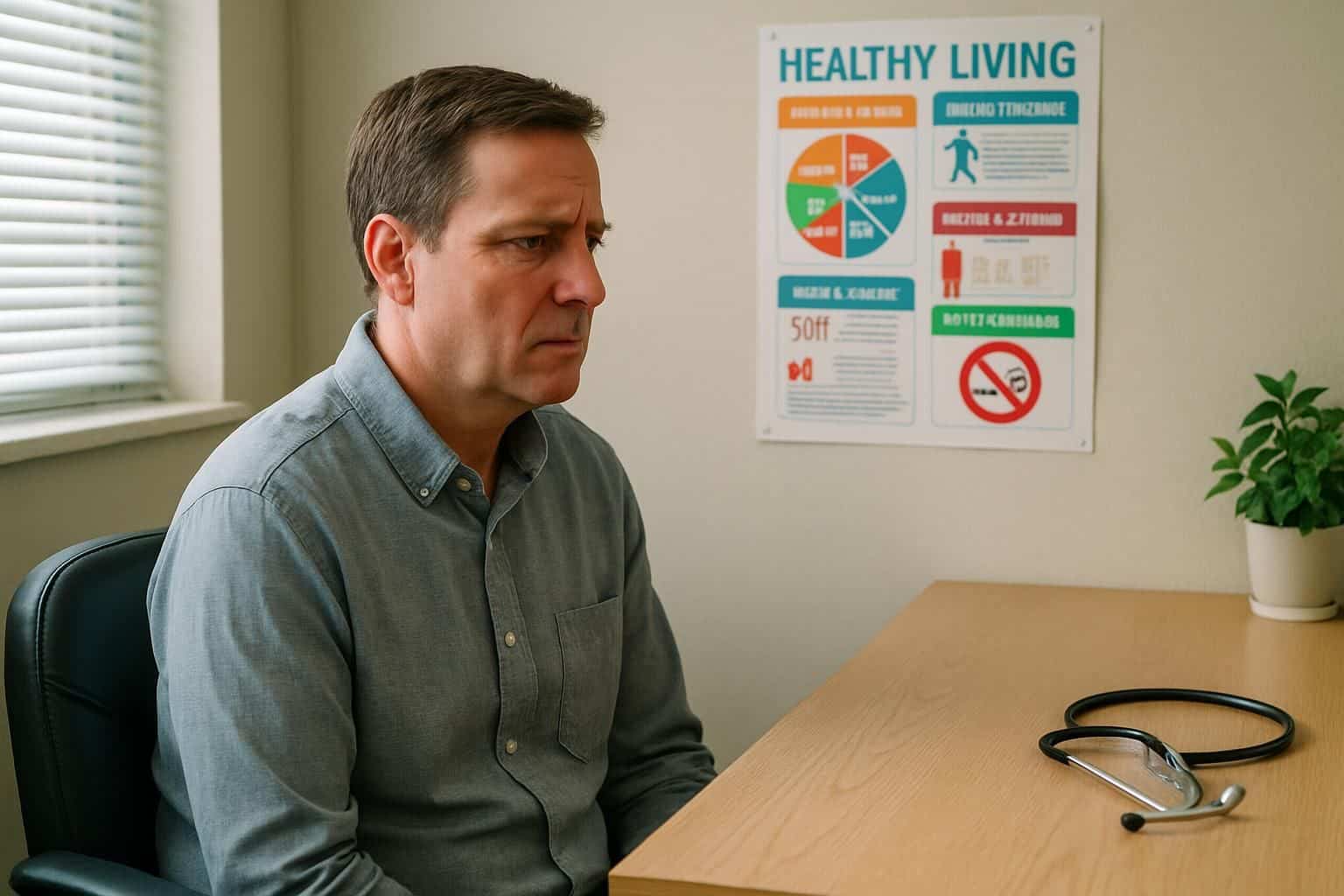Feeling tired, moody, or noticing unwanted weight gain? Around age 30 to 40, men’s testosterone begins to drop, affecting mood, strength training results, body fat location, and sex drive.
This guide shares simple but effective health tips for men to boost your body, mind & mood in 2025. Read on for easy ways to feel stronger and healthier soon.
Key Takeaways
Men’s testosterone levels start declining between ages 30 and 40—this drop can weaken mood, strength, libido, and increase body fat.
Boost protein intake to around 25 grams per meal, add daily fiber (about 25-38 grams), choose healthy fats, and limit added sugar to no more than 36 grams a day.
Aim for at least 150 minutes of physical activity every week—mix cardio with strength exercises, and avoid too much sitting.
Combat stress with relaxing hobbies, simple meditation practices, or gentle stretches—doing this often can help protect testosterone levels.
Get regular yearly health checkups to spot any issues early, and start prostate screening by age 50—or sooner if prostate problems run in your family.
Table of Contents
Maintain a Balanced Diet

Your plate needs the right mix of foods to keep your body running at its best. Good nutrition forms the base for all other health goals you want to reach in 2025.
Prioritize protein, fiber, and healthy fats
Guys often overlook three essential nutrients for peak health—protein, fiber, and fats. Protein builds muscle, boosts strength, and keeps hunger at bay. Aim for around 25 grams of protein each meal—that’s a smart place to start.
Most men don’t get enough fiber, with only 5% hitting the recommended daily intake of 25 to 38 grams. Adding more fiber supports weight control, improves digestion, and even lowers your risk of heart disease.

Don’t avoid fats—healthy fats are vital for your body. They naturally boost testosterone and fight inflammation, offering protective benefits for heart health. Good sources are avocados, nuts, fatty fish, and olive oil.
Recently, I tossed a handful of almonds into breakfast cereal and noticed higher energy at work all morning.
Eating balanced meals with these three key nutrients helps keep your cholesterol and blood pressure steady. Together, smart food choices support physical health and clear thinking, especially through strategies like mindful eating.
Now, let’s check out how proper exercise fits into the picture.
Limit added sugars and refined carbohydrates
Protein, fiber, and healthy fats strengthen your body, while cutting sugars and processed carbs keeps it safe. Eating too much sugar hurts your testosterone levels—so keeping it low matters.
The American Heart Association recommends men limit added sugars to 36 grams per day. That’s roughly nine teaspoons, less than what’s found in one can of soda! Refined carbs, like white bread, pastries, and sugary cereals, cause blood sugar spikes followed by sharp drops—leaving you tired and cranky afterward.
The food you eat can be either the safest and most powerful form of medicine or the slowest form of poison.
Processed carbs hide quietly in many packaged snacks and prepared meals. These hidden carbs can cause extra belly fat, known as visceral fat. Visceral fat boosts your risk of type 2 diabetes and heart disease.
Foods high on the glycemic index may harm your emotional health as well. Research links these foods with poorer mental health outcomes. Simple swaps help protect you, like choosing whole-grain bread instead of white, or grabbing fruit instead of candy.
Even away from home, you can stick to these healthy eating habits even in a hotel.
Stay Physically Active

Regular movement keeps your body strong and your mind sharp. Daily exercise fights disease and boosts your energy levels for years to come.
Engage in regular exercise
Exercise keeps your body healthy, strong, and ready to fight off illness.
- Aim for 150 minutes of physical activity each week—that’s only 30 minutes a day, five days a week, easy to slot into your daily routine.
- Combine cardio and strength training exercises for optimal results. Cardio improves your heart, while strength workouts maintain muscle, which naturally fades as you get older.
- Pick activities you honestly like. Shooting hoops with your buddies, exploring hiking trails, or swimming some laps can turn working out from a boring task into something you enjoy.
- Treat workout sessions just like important meetings—block off specific times on your calendar and respect them as appointments you shouldn’t miss.
- Keep track of your progress through apps or even a simple notebook. Noticing improvements in your strength, stamina, or weight loss boosts your drive, especially on days you feel less motivated.
- Pay attention to your body to avoid injuries. Normal muscle soreness can occur after workouts, but sharp pains signal it’s time to stop.
- Get outside to exercise whenever you can. Fresh air and sunshine provide vitamin D and lift your mood in ways indoor exercise can’t.
- Sign up for group fitness classes or work out with a friend. Having others around increases your motivation, helps you stick to it, and adds a social element to exercising.
Avoid prolonged sedentary habits
Sitting for too long ruins your health. Studies show that a sedentary lifestyle causes around 3.2 million deaths every year. Personally, I’ve noticed my own energy drops off after sitting at my desk for hours.
Your body needs breaks, about every half-hour, to keep blood flowing well. Stand up, stretch your arms, or walk around your room or office. Even these short actions lessen the harmful impacts of sitting—like weight gain, high blood pressure, and metabolic syndrome.
Motion is lotion for your body – regular movement throughout the day keeps your systems running smoothly.
Small adjustments can boost your health in big ways. Set a phone alarm as a quick reminder to move. Swap your regular chair for a stability ball for part of the day. Stand or walk while taking phone calls.
Park your car farther away, adding extra steps to your day. Your heart, muscles, and joints will feel better if you interrupt long periods of sitting with movement. These habits lower cholesterol levels and cut down your risk of heart disease over time.
Prioritize Mental Health

Your mental health matters just as much as your physical health. Men often ignore stress and emotions until they cause bigger problems.
Manage stress effectively
Stress seriously impacts men. High cortisol levels can reduce testosterone, tanking mood and draining energy. I discovered that just ten daily minutes of meditation slashed my stress levels in half—without much effort.
Fishing, woodworking, or even playing video games are easygoing hobbies that help reduce tension. Regular exercise, along with gentle stretching, naturally lowers your stress hormone levels too.
A lot of men overlook how closely stress links to physical wellness—it touches everything from sleep quality to heart health. Avoid negative internal chatter; instead, practice kinder thinking to ease stress.
Check out this article on avoiding unkind self-talk for more insight.
List relaxing activities you enjoy, then schedule them into your calendar exactly like important meetings; it helps you commit. Most guys skip this scheduling step; making relaxation a priority though, really pays off.
Physical movement offers double benefits because it fights stress while boosting your fitness. Finally, solid sleep routines become another critical piece in improving men’s overall health.
Ensure adequate sleep
Your body depends on restful sleep to stay healthy and strong. Most men need about seven hours of sleep per night to maintain good physical and mental health. Deep, restful sleep also protects your heart by lowering blood pressure and slowing your heart rate during the night.
Yet many men cut back on sleep to cram more into their busy schedules—but that habit gradually damages their health. Poor sleep patterns lead to weight gain, mood swings, and decreased sex drive—all issues you’d rather avoid.
To improve your sleep quality, set a consistent bedtime, keep your bedroom dark and cool, and turn off electronic devices at least an hour before bedtime. Deep sleep allows your muscles to repair and rebuild, helping you recover faster after exercise.
Now, let’s check out preventive health tips that can boost your overall wellness, helping you feel your best for years ahead.
Focus on Preventive Health

Men often skip doctor visits until something hurts. Regular health screenings can catch issues early, saving you from bigger problems down the road.
Schedule regular checkups
Regular checkups can spot health issues early, before they grow into bigger problems—even if you feel fine. Skipping doctor visits until something feels wrong can put your health at risk. Staying on top of routine screenings could save your life.
Here’s a quick and easy checklist to help stay healthy:
- Schedule an annual physical with your doctor to review blood pressure, cholesterol, and healthy weight targets.
- Check yearly for signs and risk factors linked to heart disease and stroke, two major health dangers for men.
- Ask about prostate cancer screening starting at age 50—or sooner if prostate cancer runs in your family.
- Visit your dentist every six months for cleanings to prevent gum disease, which can lead to health problems like heart disease.
- Get your eyes checked every two years to watch for vision issues or early symptoms of conditions such as diabetes.
- Talk with your doctor about colon cancer screenings; start these at age 45 unless you’re at higher risk and need testing earlier.
- Review vaccinations you might need during your visit, like the yearly flu vaccine, tetanus booster, and other recommended age-based shots.
- Keep track of important health numbers—your blood pressure readings, weight, and cholesterol levels—between doctor appointments.
- Write down your questions or concerns before each doctor visit so nothing important slips your mind.
- Carefully follow up on any test results or specialist referrals recommended after your checkup.
Monitor prostate and overall health
Prostate health matters greatly for guys over 40—taking a few simple steps now can greatly boost your well-being and protect you from serious health problems later.
- Visit your doctor every year for a checkup—this catches issues early before they get worse. Last year, I skipped my yearly exam, and this time, the doctor noticed my blood pressure was slightly elevated.
- Learn the common signs of prostate trouble: difficulty urinating, weak urine flow, or needing the bathroom multiple times each night.
- Follow your doctor’s advice on scheduling the PSA (prostate-specific antigen) blood test, as this easily screens for prostate cancer risk.
- Eat good foods that support prostate health. For example, tomatoes, oily fish (like salmon or mackerel), and green tea may lower your chances of prostate issues.
- Cut down on dairy foods and red meat—some studies show a connection between eating these regularly and higher prostate problems.
- Stay physically active with about 30 minutes of exercise daily. Physical activity helps you keep weight down and lowers overall cancer risk.
- Be upfront with your doctor if you notice changes or discomfort while urinating. Many men feel awkward bringing it up, but early care makes a big difference.
- Keep alcohol intake moderate—no more than two drinks a day—to safeguard your liver health and lower cancer threats in general.
How Will Men’s Health Evolve in 2025?

Men’s health care is set to change dramatically by 2025—and it’ll make life easier. Digital health devices will soon help track your blood pressure, weight, and other important health information right from your home.
These smart tools will send your data directly to your doctor, saving you from extra office appointments. Telemedicine will also become more popular, letting you connect with health experts through quick and convenient video calls.
This trend especially benefits guys who feel uneasy during checkups, or those whose busy schedules make office visits tough.
Routine health checks will soon become quicker and easier to access, too. Simple tests for diabetes, high blood pressure, and cholesterol will pop up in pharmacies, grocery stores, and other common shopping spots.
Making these checkups widely available gives men from all walks of life more chances to find and treat health issues early.
Mental health care will receive greater attention as well. New apps and online tools will arrive, focused on reducing stress, improving sleep quality, and keeping you feeling your best.
The goal behind all these changes is simple—spot potential health issues earlier and help make healthy choices a natural part of your daily life.
People Also Ask
What are the key elements of a healthy diet for men in 2025?
Eating for health in 2025 means choosing lots of fruits, vegetables, whole grains, and lean proteins. Aim for a Mediterranean-style pattern—this plan promotes weight control, lowers cholesterol, and boosts overall heart health. Limiting junk food can help reduce your risk for chronic illnesses and keep your energy steady throughout the day.
How much physical activity do men need for good health?
Men need at least 150 minutes of aerobic exercise every week, plus two sessions of strength training. Regular workouts improve blood pressure, lower the danger of heart attacks, and balance body fat. Even short bursts of activity during the day help break sedentary habits and keep you healthier.
Why is weight management important for men’s health?
Managing weight helps reduce your chance of heart disease, high cholesterol, diabetes, and obesity. Extra body fat around your belly increases the risk of diabetes and even some kinds of cancer. Staying at a healthy weight keeps you feeling better and prevents serious medical issues.
Can lifestyle changes help with urinary symptoms and erectile dysfunction?
Absolutely—pelvic floor exercises can help ease urinary issues like overactive bladder and improve control. Cutting down on caffeine and alcohol also lessens bladder symptoms. For erectile dysfunction, changes like getting more physically active, drinking less alcohol, and eating better often lead to noticeable improvements, even without medication.
How often should men get health checkups?
Men over 40 should see a primary doctor once a year. Regular visits help your healthcare provider keep an eye on blood pressure, cholesterol, and other important health signs. Yearly exams catch potential problems early and make treating issues simpler.
What role does mental health play in overall men’s health?
Mental and physical health go hand in hand. Poor sleep, stress, and heavy drinking can harm both your body and emotional well-being. Taking time for yourself, relaxing regularly, and connecting with friends and family all support good mental health. If you start feeling overwhelmed or anxious—reach out to a professional, who can help you get back on track.
References
https://www.houstonmethodist.org/blog/articles/2023/jun/15-fitness-nutrition-tips-just-for-men/
https://www.healthline.com/nutrition/13-habits-linked-to-a-long-life
https://www.mayoclinic.org/healthy-lifestyle/fitness/in-depth/exercise/art-20048389
https://www.health.harvard.edu/mind-and-mood/more-evidence-that-exercise-can-boost-mood
https://pmc.ncbi.nlm.nih.gov/articles/PMC7700832/
https://www.premiermedicalhv.com/news/manage-stress-and-boost-your-mental-well-being/
https://www.sleepfoundation.org/how-sleep-works/benefits-of-sleep
https://namimaine.org/start-fresh-tips-for-setting-achieving-mental-health-goals/
https://www.swgeneral.com/blog/2025/april/staying-healthy-for-the-long-haul-a-guide-to-men/ (2025-04-30)
https://www.worldclinics.net/en/blog-detail/men-s-health-prostate-health-preventative-care-and-more
https://feea.org/2024/06/mens-health-month/
https://thrivewellness.clinic/mens-health-trends-in-2025-innovations-and-insights-for-better-living/ (2024-12-30)

